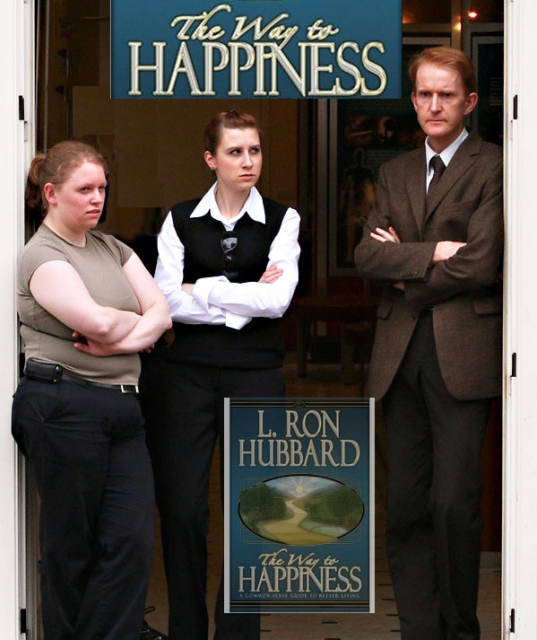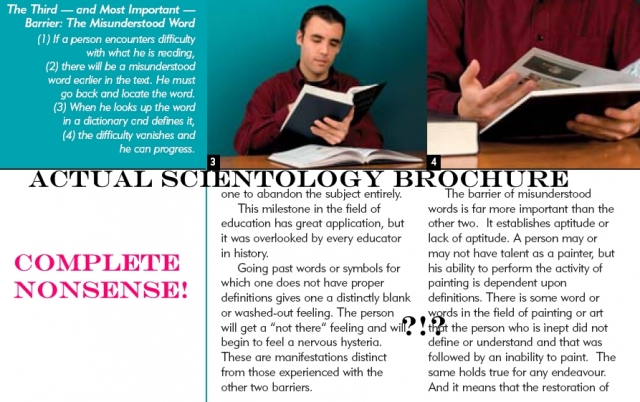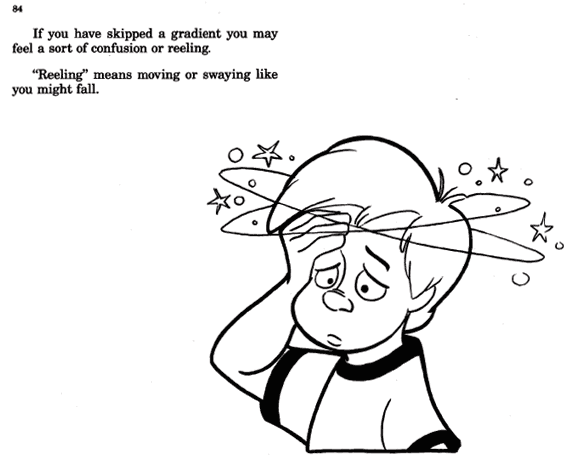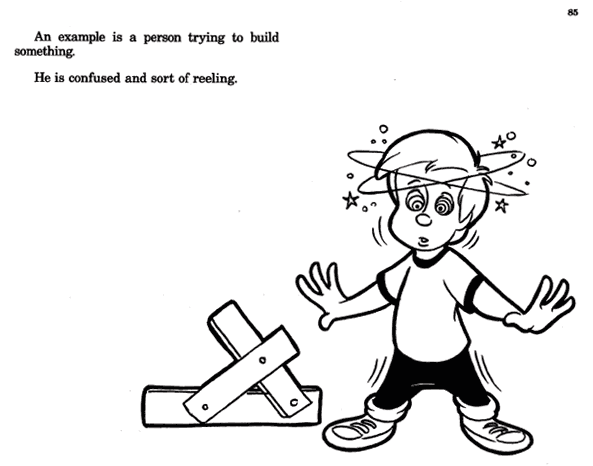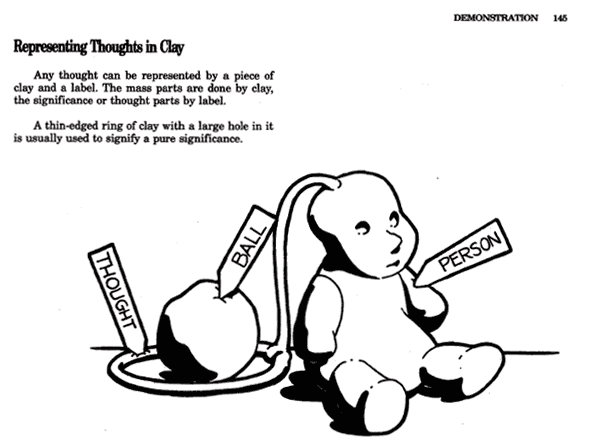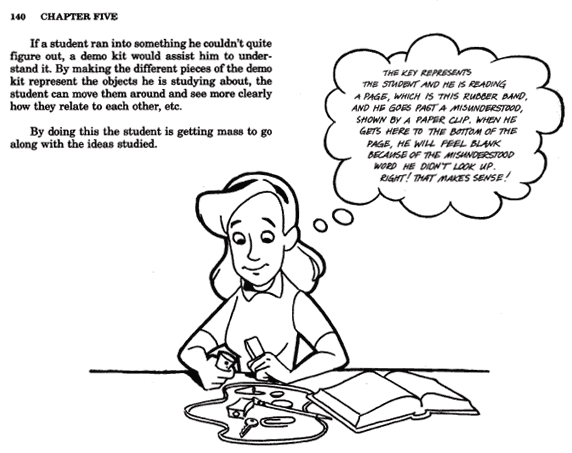Scientology "Study Tech": Start the brainwashing early
David Touretzky, PhD, is Professor of
Computer Science at Carnegie Mellon University in Pittsburgh, USA. He
is a long-time critic of the Scientology cult, and in 2003 wrote an
exceptionally useful essay about Study Tech: "The Hidden Message in L. Ron Hubbard's "Study Tech." Touretzky's analysis explains
not only the hidden Scientology doctrine within Study Tech, but also
addresses the question of whether or not it is effective. (SPOILER:
It's not effective.) Touretzky says that Study Tech "was designed
for indoctrination, not education. While it may be good at producing
obedient Scientologists, it is completely at odds with promoting the
ability to think independently. It quite deliberately aims to reduce
a student's ability to think critically. Students are taught to distrust
their own intelligence and background knowledge, passively and uncritically
accepting whatever they are being told."
The Principles
Study Tech is founded on three principles.
"Mass," "Gradients," and "Misunderstoods."
All three terms are very significant in the Scientology cult. Touretzky
cites the Study Tech materials in their claim that ONLY pictures can
provide the "mass" required to understand a concept.
"If you are studying about tractors, words on a page or someone telling you about tractors is no substitute for having an actual tractor there. Photographs or motion pictures are helpful because they at least give the hope of the mass of a tractor."
(Study Skills for Life, p. 21.)
'But reading books or listening to someone talk does not give you mass."
(Learning How to Learn, p. 70).
Study Tech books claim that several "nonoptimum
physical reactions" are associated with "absence of mass."
Such an absence of mass can actually make a student feel squashed. It can make him feel bent, sort of spinny, sort of dead, bored, and exasperated.
(Basic Study Manual, pp. 25-30)
Scientology teachers are quick to declare
that a bored or exasperated student may have learning difficulties.
With regard to "Gradient,"
a definition comes from Scientology's official glossary:
"Gradient: a gradual approach
to something, taken step by step, level by level, each step or level
being, of itself, easily surmountable -- so that, finally, quite complicated
and difficult activities or high states of being can be achieved with
relative ease. This principle is applied to both Scientology processing
and training."
The very same definition is given in
the Study Tech glossary, only omitting the final sentence. Touretzky
explains how Scientology "turns this sensible advice into rigid
dogma, with a warning that violations can have unpleasant consequences."
For example, one finds a cartoon with
a picture of a boy who skipped a step in building a dog-house, and now
he is seeing stars and feeling woozy. "If you have skipped a gradient
you may feel a sort of confusion or reeling" (Learning How to Learn,
p. 84.)
Touretzky notes: "Within Scientology,
the gradient doctrine is an important tool for controlling the flow
of information. It discourages beginning students from looking too closely
into Scientology's claims. Students are told to accept things on trust
and to wait until they are deemed ready for the facts. This is the bait
used to attract many a new member."
On the principle of "Misunderstoods,"
I will cite Touretzky at length:
The third principle of Study Tech
centers on the concept of misunderstood words. They're called "misunderstoods"
in the books, and abbreviated as M/U or Mis-U in Scientology. Misunderstoods
can be "cleared" by looking up the word in a dictionary. This
is fine as far as it goes; students should certainly learn to use a
dictionary. But according to Hubbard, misunderstood words are not a
minor problem; they are in fact "the most important barrier to
study" (Learning How to Learn, p. 101; Basic Study Manual, p. 49),
and "the only reason a person would stop studying or get confused
or not be able to learn" (Learning How to Learn, p. 114; Basic
Study Manual, preface). In fact, "THE ONLY REASON A PERSON GIVES
UP A STUDY OR BECOMES CONFUSED OR UNABLE TO LEARN IS BECAUSE HE HAS
GONE PAST A WORD THAT WAS NOT UNDERSTOOD" (How to Use a Dictionary,
p. 282; capitalization as in the original.) This sentence also appears
in the frontmatter of all Scientology religious volumes.
This emphasis on the misunderstood
word, in isolation, turns common sense into irrational dogma. Students
are told explicitly that when they have a problem with understanding,
"It's not a misunderstood phrase or idea or concept, but a misunderstood
WORD" (Basic Study Manual, p. 153, emphasis as in the original.)
The Study Tech materials claim that a
single misunderstood word can cause a student to completely forget everything
read so far, or make them want to stop learning. Among other bizarre
notions, it can also cause "a sort of nervous hysteria."
Touretzky points out that "Study
Tech is also an effective method of social control in the classroom.
If one expresses disagreement with the material one is studying in Scientology,
that's taken as evidence of a misunderstood word. And each M/U must
be located and cleared before moving on to other material… All disagreement
is dismissed as misunderstanding -- a dangerous attitude for an educational
system to promote."
Touretzsky's incisive analysis of Study
Tech cannot well be summarized in the brief context of this article.
I really recommend that you read it yourself. I will finish with some assessments
of Study Tech by genuine authorities in the field of education (i.e.
not Scientology shills), quoted by several journalists, and cited by
Touretzky.
"In my opinion, they are involved
in the worst kind of deception. They make grandiose claims about the
effectiveness of their methods and materials ... with data that has
never been published in a legitimate educational research journal."
Scot Danforth, who oversees teacher education for the University of
Missouri at St. Louis.
===
They "violate everything we
know about how children learn, and appropriate pedagogy. In short, these
books should be carefully placed in the cylindrical file." Johanna
Lemlech, Professor of Education at the University of Southern California.
===
"In many cases, lack of comprehension
is not because of a misunderstood word," says Sidnie Myrick, who
leads a UCLA research group on early literacy, teaches a master's course
in reading at Cal State L.A., and also teaches a class of first, second
and third graders at Thomas Edison Elementary School in Glendale (she
was Glendale's 1993 Teacher of the Year). "In fact," she says,
"in many cases the student won't get the meaning until the material
is presented in a completely different way."
Myrick also finds the books' illustrations
"cutesy and condescending," the explanations "stilted
and manufactured," and study technology, all in all, "woefully
inadequate."
==
One member of the Los Angeles school
board is unimpressed. A former high school history teacher, David Tokofsky
calls the books "remedial" and says they would be of little
use to any but the lowest-performing students. "If you walked into
an eighth-grade class and tried to use these books on kids who are at
the proper level, you'd kill them," says Tokofsky, who coached
the Marshall High School Academic Decathlon team to a national championship
in 1987. "They're not even good comic books."
"The reading process is so complex,"
she said. The principles in Hubbard's three barriers to learning focus
primarily on reading at the word level.
===
"But there is a whole other
aspect of the reading process that is ignored," added Ms. Vogt,
who is a former president of the California Reading Association and
a past board member of the International Reading Association.
"For older readers, we sometimes
say, 'Skip a word you don't understand and try to gain comprehension
from the whole context,'" she said. "We don't say that for
young readers. But for older readers, it is extremely cumbersome to
try to attend to every word."
===
Victoria Purcell-Gates (now at Michigan
State University), who reviewed the Basic Study Manual, told NOW magazine
that the merits of study tech are suspect:
"There isn't anything new. It's
also sort of sketchy. What we know about teaching comprehension skills
and study skills is a little more complex."
Purcell-Gates says the program's
emphasis on use of the dictionary "is probably not the most effective
tool for learning word meanings, because dictionary definitions tend
to be very decontextualized. Teachers wouldn't use that as a primary
vehicle for teaching vocabulary."
See Also:
Scientology's
Study Technology
The Hidden Message in L. Ron Hubbard's "Study Tech"
Study tech is quite interesting, because since it's always after words meaning, it distracts the students from the CONTENT of the study. They try to get the ideas behind the words, they "demonstrate" these ideas, but they have almost no way to distinguish the value and veracity of the subjects. That's how Hubbard has been able to brainwash a lot of people, many of them educated and able to read.
Study tech can be applyed to any study as you learn how to understand the subject.
In the article it is written that understanding of the words is not the key factor in learing.... Well try to read chinese... If you donìt understand each simbol you will not understand the sentences.
This is also valid in English. If a person does not know at all what a "cat" is, if he read the sentence "John has seen a cat" he will not understand the sentence!!! Of course he can invent a definition for "cat" thinking it is a "chair" but that will not help...
I remember one time that I was helping a non scientologist youn man that had problems in mathematics. I didn't even solve the problems he had. I just found what words in mathematics he was not understanding and I helped him cleear the their meaning. He left. After one hour his mother called and told me the for the first time she saw that his son was understanding mathematics... and I didn't even solve any question he had.... just clearing the words of the subject using a dictionary!!!
So study tech works!
There are also other two key points on study tech
"Lack of mass" and "skipped gradient".
Of course if one studies about "tracktors" and does not have any tracktor he will have problems... If he study about how to repair a tracktor it is much better to have a tracktor nearby so one can see in reality the parts.
Gradients... Basically it is just the concept that one should study starting from the basic points and then add up little by little and not starting the subject of additions today "1+1=2" and then immediately go to high level algebra "x=log(y)-a(b*k)!"
So study tech is very sensible and who does not want students to apply it is just trying to create stupid students unable to apply what they learn... is this what happened to "modern" education?
Study tech is the solution to create students who
1- Understand what they learn.
2- Are able to apply what they have studied.
If Scientology worked as well as the Church of Scientology claims, what would the church be like?
If Scientology worked, the citizens of Clearwater, Florida, would, by now, be extremely happy to have "Flag, the Mecca of Scientology" in their fair city. After all, the vast benefits and good community work would have won them over completely. But, excluding Scientologists themselves, the people of Clearwater are still very upset with how the church "snuck" into town and would be very pleased if the church just snuck right back out.
If Scientology worked, their superior public-relations technology would ensure that the public image of the Church of Scientology was overwhelmingly positive, all over the world.
If Scientology worked, the church would never be embarrassed when their videos are leaked (and found to contain bogus claims by bogus "officials").
If Scientology worked, their powerful OT-8s would make everything go right, not only for Scientology but for the whole world. They are, after all, cause over life, form, matter, energy, space and time ... aren't they?
If Scientology worked, there would be no accusations of abuse, crimes or fraud. Their superior technology would quickly clear up everyone's difficulties, and would effectively "shatter" any suppression so that there would be no victims and no enemies.
If Scientology worked, there would be world-wide acclaim at the Church's effective solutions in disaster areas, war zones and poverty regions. The demand for Scientology solutions would be overwhelming. People outside of Scientology would actually be aware of these "solutions".
If Scientology worked, the huge news announced in the big Scientology events would actually be true and would be reported by regular news sources outside of the events.
If Scientology worked, no one would ever want to leave the church. All promises would have been kept, all promised benefits would have been true and the number of Scientologists, world-wide, really would be in the tens of millions (instead of the actual figure of less than 50,000 and falling).
If Scientology worked, the Church would not be desperately hammering the few remaining Scientologists for money, more money and even more money.
If Scientology worked, all the top executives of the Church would still be there, on post, instead of only David Miscavige.
If Scientology worked, they would not have to lock disaffected staff up in pseudo-prison camps to keep them from leaving and telling their stories.
If Scientology worked, I wouldn't be writing this post.
Why not use a dictionary to look up words you don't understand? That's what a dictionary is for! The concept of trying to understand a word in context is fine in conversation and perhaps light reading, but it is undeniable that such methods can leave people with the wrong concept of a word. Trying to understand a word in context when studying a technical subject is a very difficult way to get through a subject. Defining the words encountered only makes the path easier for the student. This is rather easy to prove. Just find someone struggling with a technical subject, such as computers, and have them clear the basic terminology.
What I'm hearing from the critics is that because Scientology recommends you look up words in a dictionary (or other appropriate source) that practise must be wrong. Hogwash.
And what about the next concept of studying material on the proper gradient? Seems pretty straightforward that you shouldn't try to learn algebra until you've mastered arithmetic. You wouldn't want your doctor learning surgery before he's gone to med school.
And consider the idea called "lack of mass"? In layman's terms this is merely providing proper examples, practise, tools, labs so the student can see the application, put his hands on it so-to-speak, rather then only read theory. Gee folks, seems pretty rational to me. There are several methods recommended for giving a student "mass" on the subject, including working with the actual physical objects (such as having a real car when learning how to fix a car), practise drills, essays, and so forth. People point to the use of clay as wierd, only because they've never seen it before. If you think it through, when you're dealing with a very theoretical subject clay or model building can be very useful. For example, chemists build models of molecular structures to assist in their understanding and visualization of things that cannot be observed directly.
In fact, I've seen all the above methods applied in various schools. The problem is that these aren't recognized, codefied and accepted as the proper tools to use and so teachers may or may not apply them, hit-or-miss, depending on their own individual training and experience. When you have tools that make things easier you want those tools used. (Or would you want your dentist to pull your teeth because you didn't like the fellow that invented fillings?)
All Hubbard did was document these techniques and point out that they should always be used to help a student be successful.
Don't throw out the baby with the bath water.
If Scientology worked, the citizens of Clearwater, Florida, would, by now, be extremely happy to have "Flag, the Mecca of Scientology" in their fair city. After all, the vast benefits and good community work would have won them over completely. But, excluding Scientologists themselves, the people of Clearwater are still very upset with how the church "snuck" into town and would be very pleased if the church just snuck right back out.
If Scientology worked, their superior public-relations technology would ensure that the public image of the Church of Scientology was overwhelmingly positive, all over the world.
If Scientology worked, the church would never be embarrassed when their videos are leaked (and found to contain bogus claims by bogus "officials").
If Scientology worked, their powerful OT-8s would make everything go right, not only for Scientology but for the whole world. They are, after all, cause over life, form, matter, energy, space and time ... aren't they?
If Scientology worked, there would be no accusations of abuse, crimes or fraud. Their superior technology would quickly clear up everyone's difficulties, and would effectively "shatter" any suppression so that there would be no victims and no enemies.
If Scientology worked, there would be world-wide acclaim at the Church's effective solutions in disaster areas, war zones and poverty regions. The demand for Scientology solutions would be overwhelming. People outside of Scientology would actually be aware of these "solutions".
If Scientology worked, the huge news announced in the big Scientology events would actually be true and would be reported by regular news sources outside of the events.
If Scientology worked, no one would ever want to leave the church. All promises would have been kept, all promised benefits would have been true and the number of Scientologists, world-wide, really would be in the tens of millions (instead of the actual figure of less than 50,000 and falling).
If Scientology worked, the Church would not be desperately hammering the few remaining Scientologists for money, more money and even more money.
If Scientology worked, all the top executives of the Church would still be there, on post, instead of only David Miscavige.
If Scientology worked, they would not have to lock disaffected staff up in pseudo-prison camps to keep them from leaving and telling their stories.
If Scientology worked, I wouldn't be writing this post.
The principle to study tech is; as you study, barriers arise. There are ways to work through the barriers and understand application.
Insane yet funny attack site made by Scientology
They've got 5 or 6 pages there of
Study tech is not exempt of any advantages, but it has to be severely modified, and the use of the e-meter and of some methods of "wordclearing" should be forbidden, since they are wrong and anti-scientific.
In fact, the use of such tools lead the students directly into other subjects thant those studied, and it's diverting them from the reality of the matter at hand.
Thank you for saying that "study tech is not exempt of any advantages..." My fear is that the readers herein will reject these concepts in total because of the bias expressed towards Scientology. Study tech contains fundamental concepts necessary to the successful study of any subject, and rejection of these concepts out-of-hand will only hinder a student. My daughter, while studying material in class in her high school, would regulary go to a dictionary to define words that were new to her. The teachers were non-plussed and would ask her why she needed to do that. Their attitude, and ignorance of this technique is what is so striking to me.
By the way, Study tech doesn't say or imply that the student "accept" the definitions as given by the author of the subject, merely that he understand how the word is defined and how the author defined the word, and so be able to understand the idea the author is trying to convey. None of this means that the student must agree with the author, but it does mean that the student should understand what is being written before determining that he does or does not disagree with the author.
In my work I educate groups of people regularly in business environments. I've taken techniques from Study Tech to make the training easier for my clients and myself. I use "key word lists" of commonly unknown or misunderstood technical terms so the students have the foundational definitions for the subject. I make extensive use of diagrams and pictures to provide some mass to the theory. When people seem to become confused, I backtrack to find the skipped gradient. Please note that I have no intention of introducing these people to Scientology. I'm using effective tools to provide a better product for my clients.
It's fine if Study Tech works for you and your clients. It's fine if people want to believe in body thetans and Lord Xenu and DC-8 space-planes and the 5th Invasion Fleet with their "unthinkably horrible," insectoid hands. The problem is not what Scientology believes. That isn't the issue at all. The problem is the Scientology Organization's abusive practices, fraudulent conduct, "religious cloaking," tax evasions and other financial shenanigans, government-infiltrations, and overall lack of transparency. It becomes a problem when L. Ron Hubbard is presented as a great humanitarian and "famous human rights leader," alongside such figures as Gandhi, Martin Luther King, and Voltaire. It becomes a problem when L. Ron Hubbard is presented as a spiritual genius who was recognized as such by an Indian shaman at the age of 4 and who meditated with Tibetan monks at the age of 12. In short, it becomes a problem when L. Ron Hubbard is presented in a variety of extremely attractive personifications, none of which are true. Young and impressionable people would be much more easily drawn to become Scientologists, particularly if various Scientology front groups such as "Youth For Human Rights" (sic) and Citizens Commission on Human Rights" (sic) are also invited to speak to the school, promoting their ridiculous anti-psychology, anti-psychiatry hate message (this is certain to happen).
Hubbard flunked early out of college (he did not graduate in nuclear physics), he served in the US navy without particular distinction (he did not see battle and was never "blinded"); but he was a talented writer. He traveled with his family when he was young, but he did not make earth-shaking discoveries or explore uncharted lands. He suffered from depression; he had some good times and some bad times, before writing Dianetics. He wasn't a bad guy; just had some flaws, as everyone does. Why not stick with the truth? He was an intelligent man, a good writer, but like many people, he did not particularly excel in his endeavors. When people began to flock around him because of his book, he told lots of lies about himself that people believed and made into sacred history. If Study Tech works for some people (as obviously as it does not for many others), then Good Job, Ron.
If Study Tech is implemented at New Village Academy in the current context -- with Scientology Organization preparing to write dozens of fawning press releases as we speak, lining up its CCHR speakers, etc. -- then the school will simply be a factory for creating the next generation of Scientologists.
By the way, maybe it works for you, as I concede -- but why not teach children with a method that has been shown empirically to be effective and passes peer scrutiny? Study Tech is only promoted by Scientology and Scientology-related organizations. It is only lauded by Scientologists and by educators e.g. in Pakistan or Zambia who have been given a one-day seminar and in all the excitement of the day have written some effusive comments about it. Why is that, do you suppose? If it's so great, why aren't all schools clamoring to use it?
Are there any PhDs or MDs or JDs (from accredited institutions) who grew up using Study Tech? Nobel Prize winners, perhaps?
For that matter, is there even one highly-successful business in the world that uses Hubbard's "administration" methodology?
Caveat emptor.
Meanwhile, the cult/criminal racket of Scientology is crumbling all around you. What did Scientology do to pull this in?
By the way, was LRH stupid? LRH declared, in "Keeping Scientology Working", that the technology was complete and was as perfect as it was ever going to get. He said don't mess with it, don't change it, and stop others from altering it.
Hubbard, over the years, personally taught many people how to apply the tech. He trained people on how to audit and supervise. He worked out all the training methods and content. When he trained the Flag auditors and supervisors, he declared their training to be "perfect". He personally developed and approved all the auditor training courses, checksheets, etc.
Yet, only a few years after Hubbard's death, Miscavige completely rewrote the technical training - methods and content, and dubbed it the "Golden Age of Tech". He then canceled all the certificates of everyone trained under Hubbard's methods. Even those who had been personally trained by Ron. Personally trained by Ron!
Is this clear enough for you? Miscavige said that L. Ron Hubbard was wrong! Miscavige said that Hubbard's training methods were wrong! He said that all those personally trained by Ron were so poorly trained by Hubbard that they had to retrain from scratch, using the correct, Miscavige methods.
Was Hubbard so stupid and so unobservant that he couldn't train people competently? That's what Miscavige claims in no uncertain terms. What do you think?
How about another example?
For more than thirty years, Hubbard wrote tons of books. The books were reprinted many, many times. Various people have reported working with LRH on getting the reprints exactly right, under Ron's strict guidance. Others have reported seeing copies of the books, marked up with LRH's notes in preparation for a reprint. LRH took great care with his books and their many reprints. To Hubbard, his books were the most important things he had ever produced.
Yet, for the second time after LRH's death, Miscavige has undertaken an extensive rewrite of Hubbard's books, claiming they were wrong, wrong, wrong! Today, you are not allowed to own the original books printed under LRH's directions, you must own the Miscavige versions.
Was Hubbard so stupid and so unobservant that he missed those massive errors, even as he read his own books and noted down corrections and changes he wanted, year after year, decade after decade? Was he so stupid that he allowed significant errors to continue printing after printing after printing? This is what Miscavige claims. Do you think he's correct?
You can't have it both ways. You can't think that LRH was brilliant, but then, at the same time believe that Hubbard was so stupid and so wrong about his own technology, his own training, and his own statements about the people he trained. You can't have it both ways.
You can't believe that Hubbard was a careful, thorough, brilliant writer, but then, at the same time believe that he never, ever checked his own works as they were being printed. Never cared. Never checked his books again when they were reprinted. This is something even the most inexperienced of authors takes pains to do. Was Ron as careless and stupid as Miscavige claims?
You can't have it both ways. If you believe Miscavige, then you must agree with him that Hubbard was abysmally stupid and careless about the things that Ron said were absolutely, vitally, most important: his all-important tech, and his all-important books.
If you are going to go along with Miscavige's massive alterations then you obviously agree with him that Ron was really, really stupid.
And that's what Miscavige wants you to believe.
Think about it.
Get Involved
If you'd like to help with maintaining or developing the website, contact us.
Publish
Publish your stories and upcoming events on Indybay.


